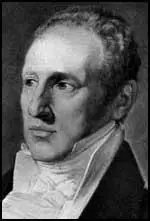John Walter II

John Walter II, the son of John Walter, the owner of The Times, was born 1776. John's father retired in 1803 and he became the new proprietor of the newspaper. He decided he wanted to run the newspaper that was independent of government control. Walter began employing young journalist who supported political reform including Henry Crabbe Robinson, Charles Lamb, William Hazlitt and Thomas Barnes. The newspaper turned away from government minister's handouts and instead developed its own news-getting organisation.
John Walter also introduced new technology into The Times. In 1817 he installed a steam-powered Koenig printing machine. This increased the speed that newspapers could be printed and by the end of the year, the newspaper was selling over 7,000 copies a day. In the same year that the newspaper obtained their steam-powered printing machine, Thomas Barnes became the new editor of the newspaper. Barnes was a strong advocate on independent reporting. In 1819 he published a several articles written by John Edward Taylor and John Tyas on the Peterloo Massacre. The Times criticised the way Lord Liverpool's government was dealing with those arguing for political reform.
After the massacre The Times began to argue for parliamentary reform. By 1830 the newspaper was constantly urging the Whig government to take action. The views of the newspaper and its editor, Thomas Barnes, had a great influence on public opinion. The government tax on newspapers meant that its price of 7d. made it too expensive for most people to buy. However, copies were available in reading rooms. In 1831 the Tory St. James's Chronicle claimed that "for every one copy of The Times that is purchased for the usual purposes, nine we venture to say are purchased to be lent to the wretched characters who, being miserable, look to political changes for an amelioration of their condition."
In Parliament the Tories complained about The Times campaign. In a debate that took place in the House of Commons on 7th March, 1832, Sir Robert Peel argued that the newspaper was the "principal and most powerful advocate of Reform" in Britain. After the 1832 Reform Act was passed the newspaper called it the "greatest event of modern history."
The Times also campaigned for the rights of trade unionists. In 1834 it became involved in what became known as the case of the Tolpuddle Martyrs. The Times condemned the decision to prosecute six farmworkers at Tolpuddle for "administering illegal oaths". The Times also supported the demands that the men should be reprieved after they were sentenced to transportation for seven years.
In 1834 a group of Whigs purchased control of The Morning Chronicle. John Walter II and Thomas Barnes disagreed with the way the newspaper gave "slavish support to the government". The two men had talks with the leaders of the Conservative Party and after they had agreed that they would not attempt to interfere with reforms introduced by the the government such as the 1832 Reform Act and the Tithe Act, he agreed that the newspaper would became a supporter of Sir Robert Peel and his new government.
Thomas Barnes remained editor of The Times until his death on 7th May 1841. John Walter II died six years later.
Primary Sources
(1) Thomas Barnes, The Times (9th December, 1830)
We are staunch friends to a broad and fundamental reform; and if enemies to universal suffrage, or to the establishment of a low qualification for the great mass of electors, it is because such a principle would be, in effect, a narrowing of the representative system, by the virtual exclusion of all influence derived from property. We are haters of all monopolies, and among others of a monopoly of the elective franchise, by such a reform of Parliament, by means of universal suffrage, the mass, and with the mass the dregs, of the existing population.
(2) Thomas Barnes, The Times (21st March, 1831)
The all-important question of full and satisfactory parliamentary reform is, we have no doubt, now completely settled. The people, the brave English people have won it decidedly as they have won battles in the field or on the ocean; nor can they by any possibility be cheated or robbed of the fruits of their victory. They petitioned, they addressed, they resolved. We proposed these courses to them, we urged the prosecution of them with vigour, and our advice prevailed to a degree that even we, used as we are to move the noble feelings of our countrymen in a just cause and on subjects of vast moment - could hardly have conceived, and were almost surprised at our success.
